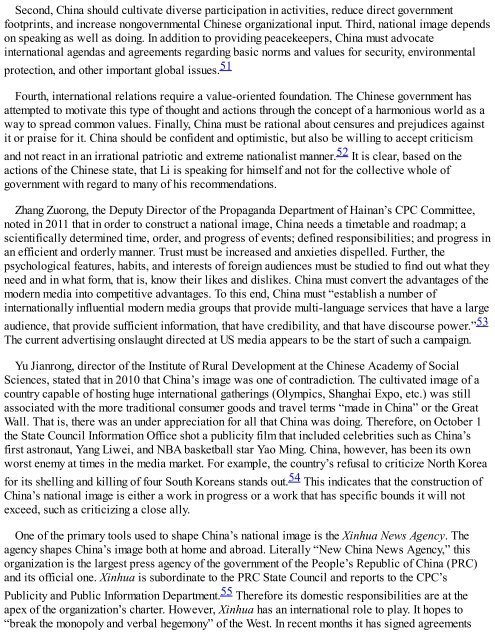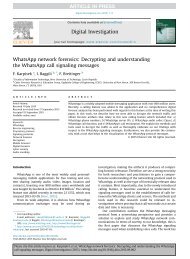3Faces%20of%20the%20Dragon
3Faces%20of%20the%20Dragon
3Faces%20of%20the%20Dragon
You also want an ePaper? Increase the reach of your titles
YUMPU automatically turns print PDFs into web optimized ePapers that Google loves.
Second, China should cultivate diverse participation in activities, reduce direct government<br />
footprints, and increase nongovernmental Chinese organizational input. Third, national image depends<br />
on speaking as well as doing. In addition to providing peacekeepers, China must advocate<br />
international agendas and agreements regarding basic norms and values for security, environmental<br />
protection, and other important global issues. 51<br />
Fourth, international relations require a value-oriented foundation. The Chinese government has<br />
attempted to motivate this type of thought and actions through the concept of a harmonious world as a<br />
way to spread common values. Finally, China must be rational about censures and prejudices against<br />
it or praise for it. China should be confident and optimistic, but also be willing to accept criticism<br />
and not react in an irrational patriotic and extreme nationalist manner. 52 It is clear, based on the<br />
actions of the Chinese state, that Li is speaking for himself and not for the collective whole of<br />
government with regard to many of his recommendations.<br />
Zhang Zuorong, the Deputy Director of the Propaganda Department of Hainan’s CPC Committee,<br />
noted in 2011 that in order to construct a national image, China needs a timetable and roadmap; a<br />
scientifically determined time, order, and progress of events; defined responsibilities; and progress in<br />
an efficient and orderly manner. Trust must be increased and anxieties dispelled. Further, the<br />
psychological features, habits, and interests of foreign audiences must be studied to find out what they<br />
need and in what form, that is, know their likes and dislikes. China must convert the advantages of the<br />
modern media into competitive advantages. To this end, China must “establish a number of<br />
internationally influential modern media groups that provide multi-language services that have a large<br />
audience, that provide sufficient information, that have credibility, and that have discourse power.” 53<br />
The current advertising onslaught directed at US media appears to be the start of such a campaign.<br />
Yu Jianrong, director of the Institute of Rural Development at the Chinese Academy of Social<br />
Sciences, stated that in 2010 that China’s image was one of contradiction. The cultivated image of a<br />
country capable of hosting huge international gatherings (Olympics, Shanghai Expo, etc.) was still<br />
associated with the more traditional consumer goods and travel terms “made in China” or the Great<br />
Wall. That is, there was an under appreciation for all that China was doing. Therefore, on October 1<br />
the State Council Information Office shot a publicity film that included celebrities such as China’s<br />
first astronaut, Yang Liwei, and NBA basketball star Yao Ming. China, however, has been its own<br />
worst enemy at times in the media market. For example, the country’s refusal to criticize North Korea<br />
for its shelling and killing of four South Koreans stands out. 54 This indicates that the construction of<br />
China’s national image is either a work in progress or a work that has specific bounds it will not<br />
exceed, such as criticizing a close ally.<br />
One of the primary tools used to shape China’s national image is the Xinhua News Agency. The<br />
agency shapes China’s image both at home and abroad. Literally “New China News Agency,” this<br />
organization is the largest press agency of the government of the People’s Republic of China (PRC)<br />
and its official one. Xinhua is subordinate to the PRC State Council and reports to the CPC’s<br />
Publicity and Public Information Department. 55 Therefore its domestic responsibilities are at the<br />
apex of the organization’s charter. However, Xinhua has an international role to play. It hopes to<br />
“break the monopoly and verbal hegemony” of the West. In recent months it has signed agreements










